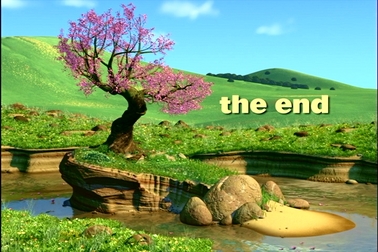Between Stockholm Syndrome and Lima Syndrome
Part 54: Denying Death at All Costs

In Part 53 ("Big Father is Watching Us"), we touched on the curious phenomenon that believers tend to act as accessories to a crime; i.e. the crime of not thinking critically, the crime to let others (translation: prophets) to "think" for themselves. That's probably the reason why religion and democracy do not mix well.
The big giants in liberal democracy--Jefferson, Voltaire, Paine, Franklin, Madison, Lincoln, Gandhi—can be categorized as non-theists, atheists, or at least religious skeptics. The big giants in religion, on the other hand, can be categorized as, well, do I need to say more? Just look at the Middle East, the cradle of the great organized religions, which has been torn by raw tribalism, barbaric persecution, totalitarianism, religious wars and sectarian violence. Still, in spite of everything, why have religions appeal so much to billions of believers?
It's death.
Death's finality makes us truly uncomfortable. Just consider the existence of 101 euphemisms for dead, death and dying in the English language: from "angels carried him/her away" to "awakened to eternal life" to "climbing the stairway to heaven" to "entering the Pearly Gates" to "kicking the bucket" to "meeting his/her maker" to "going to the Happy Hunting Grounds" and of course the most popular one, "passing away." Whether our language shapes the way we think, or our thought process shapes the language we speak, death's finality makes us quite uncomfortable. Hence we resolve the problem by denying death at all costs.
African-American novelist and social critic James Baldwin (1924-1987) described this ultimate Stockholm Syndrome best: "Perhaps the whole root of our trouble, the human trouble, is that we will sacrifice all the beauty of our lives, will imprison ourselves in totems, taboos, crosses, blood sacrifices, steeples, mosques, races, armies, flags, nations, in order to deny the fact of death, the only fact we have."
With the exception of Buddhism, Taoism and Confucianism, almost all organized religions have been quite adept in sugarcoating our mortality. Religions have made death, the most dreadful event in a human's life, more palatable, and to a certain extent even desirable. That's why organized religions tend to glorify and fetishize their martyrs, sometimes even much more so than their prophets. "Men do not accept their prophets and slay them," Russian novelist and philosopher Fyodor Dostoevsky (1821-1881) famously wrote, "but they love their martyrs and worship those whom they have tortured to death."
Is this glorification merely a manifestation of escapism? Oxford Dictionary defines escapism as "the tendency to seek distraction and relief from unpleasant realities, especially by seeking entertainment or engaging in fantasy." The unpleasant reality that has been sugarcoated so well by organized religions is nothing else but death.
We, sentient human beings, justifiably fear death. I do. That's exactly why most organized religions exploit this feeling and promise afterlife in various forms of heaven and paradise. Too many prophets and messiahs have promised to save us from eternal damnation, as long as we follow them, and pay our dues or tithes. Therefore, we heartily embrace religion and become addicted to it in a desperate act of escapism.
We think we can cheat death by bribing God and professing our belief in an afterlife. Yet, as described by Roman emperor philosopher Marcus Aurelius (121-180) in Book 2 of his timeless Meditations, death is nothing but "a process of nature, which only children should be afraid of." In Book 3, Aurelius emphatically compared death to a disembarkation process, in which nobody—not even physicians, rulers, conquerors, philosophers—is immune to it:
"Hippocrates cured many illness—and then fell ill and died. The Chaldaeans predicted the deaths of many others; in due course their own hour arrived. Alexander, Pompey, Caesar—who utterly destroyed so many cities, cut down so many thousand foot and horse in battle—they too departed this life. Heraclitus often told us the world would end in fire. But it was moisture that carried him off; he died smeared with cow shit. Democritus was killed by ordinary vermin, Socrates by the human kind.
You boarded, you set sail, you have made the passage. Time to disembark. If it's for another life, well, there's nowhere without gods on that other side. If to nothingness, then you no longer have to put up with pain and pleasure, or go on dancing attendance on this battered crate, your body—so much inferior to that which serves it. One is mind and spirit, the other earth and garbage."
[To be continued.]
Johannes Tan, Indonesian Translator & Conference Interpreter
The big giants in liberal democracy--Jefferson, Voltaire, Paine, Franklin, Madison, Lincoln, Gandhi—can be categorized as non-theists, atheists, or at least religious skeptics. The big giants in religion, on the other hand, can be categorized as, well, do I need to say more? Just look at the Middle East, the cradle of the great organized religions, which has been torn by raw tribalism, barbaric persecution, totalitarianism, religious wars and sectarian violence. Still, in spite of everything, why have religions appeal so much to billions of believers?
It's death.
Death's finality makes us truly uncomfortable. Just consider the existence of 101 euphemisms for dead, death and dying in the English language: from "angels carried him/her away" to "awakened to eternal life" to "climbing the stairway to heaven" to "entering the Pearly Gates" to "kicking the bucket" to "meeting his/her maker" to "going to the Happy Hunting Grounds" and of course the most popular one, "passing away." Whether our language shapes the way we think, or our thought process shapes the language we speak, death's finality makes us quite uncomfortable. Hence we resolve the problem by denying death at all costs.
African-American novelist and social critic James Baldwin (1924-1987) described this ultimate Stockholm Syndrome best: "Perhaps the whole root of our trouble, the human trouble, is that we will sacrifice all the beauty of our lives, will imprison ourselves in totems, taboos, crosses, blood sacrifices, steeples, mosques, races, armies, flags, nations, in order to deny the fact of death, the only fact we have."
With the exception of Buddhism, Taoism and Confucianism, almost all organized religions have been quite adept in sugarcoating our mortality. Religions have made death, the most dreadful event in a human's life, more palatable, and to a certain extent even desirable. That's why organized religions tend to glorify and fetishize their martyrs, sometimes even much more so than their prophets. "Men do not accept their prophets and slay them," Russian novelist and philosopher Fyodor Dostoevsky (1821-1881) famously wrote, "but they love their martyrs and worship those whom they have tortured to death."
Is this glorification merely a manifestation of escapism? Oxford Dictionary defines escapism as "the tendency to seek distraction and relief from unpleasant realities, especially by seeking entertainment or engaging in fantasy." The unpleasant reality that has been sugarcoated so well by organized religions is nothing else but death.
We, sentient human beings, justifiably fear death. I do. That's exactly why most organized religions exploit this feeling and promise afterlife in various forms of heaven and paradise. Too many prophets and messiahs have promised to save us from eternal damnation, as long as we follow them, and pay our dues or tithes. Therefore, we heartily embrace religion and become addicted to it in a desperate act of escapism.
We think we can cheat death by bribing God and professing our belief in an afterlife. Yet, as described by Roman emperor philosopher Marcus Aurelius (121-180) in Book 2 of his timeless Meditations, death is nothing but "a process of nature, which only children should be afraid of." In Book 3, Aurelius emphatically compared death to a disembarkation process, in which nobody—not even physicians, rulers, conquerors, philosophers—is immune to it:
"Hippocrates cured many illness—and then fell ill and died. The Chaldaeans predicted the deaths of many others; in due course their own hour arrived. Alexander, Pompey, Caesar—who utterly destroyed so many cities, cut down so many thousand foot and horse in battle—they too departed this life. Heraclitus often told us the world would end in fire. But it was moisture that carried him off; he died smeared with cow shit. Democritus was killed by ordinary vermin, Socrates by the human kind.
You boarded, you set sail, you have made the passage. Time to disembark. If it's for another life, well, there's nowhere without gods on that other side. If to nothingness, then you no longer have to put up with pain and pleasure, or go on dancing attendance on this battered crate, your body—so much inferior to that which serves it. One is mind and spirit, the other earth and garbage."
[To be continued.]
Johannes Tan, Indonesian Translator & Conference Interpreter

 RSS Feed
RSS Feed